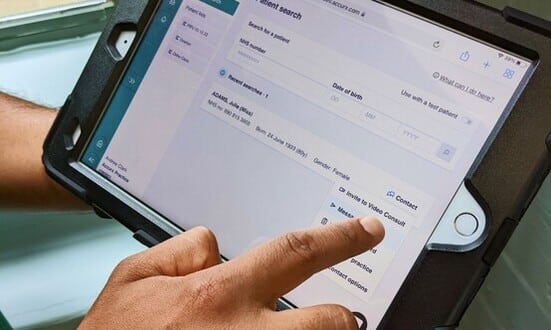Coronavirus spread has ‘kicked NHS forward in adopting digital solutions’

The rapid spread of coronavirus has given the NHS a “kick forward” in the need to accelerate technology and ensure staff are digitally prepared, a GP has said.
Neil Paul, a Digital Health columnist and GP in Ashfields, said the need to reduce face-to-face appointments to prevent the potential transmission of Covid-19 has forced the NHS, particularly in primary care, to adopt already available technologies.
He said practices “still in the stone ages” and “technophobes” were less prepared for the current situation, but that it would force them to move into the digital age.
“It’s absolutely made my surgery go ‘right, how do we do online consults’. I think it actually has given people a real kick forward,” he told Digital Health News.
“What’s really interesting is I’ve been doing some conversations with patients on Facebook and they are sort of saying ‘Well why weren’t we doing this before?’.
“I think in six months’ time my surgery might be very different in that actually we will be doing a lot of online and telephone consults where previously we may have been a bit reluctant.
“I don’t think any stunning technologies are going to come out of this, I could be wrong, but I can’t see anything that wasn’t already around. I think actually what it’s doing is making people adopt stuff that is already there.”
GP practices across the country have been advised to assess patients online or via telephone and video appointments to mitigate the potential spread of coronavirus.
In a letter to GPs last week, NHS England urged Britain’s 7,000 GP surgeries to reduce face-to-face appoints for patients displaying symptoms of Covid-19.
The preemptive move means millions of patients will now be triaged online, via telephone or video and contacted via text messaging services.
NHS England have also launched an update to NHS 111 online last week in order to help people get quick advice about coronavirus, after a surge of enquiries to the health service about the outbreak.
Michael Fisher, CCIO of Royal Liverpool and Broadgreen University Hospitals NHS Trust, concurred the virus had “sparked” further discussions around digital ideas “we’ve been talking about for a long time”.
“Remote consultation with patients, remote consultation with other doctors, more care remotely and using technology… irrespective of coronavirus this is something we should be doing much more of, in my opinion anyway,” he told Digital Health News.
“The necessary collaboration tools have been around for ages. I think coronavirus is the least of our issues where this is concerned, in the next few weeks or months that will die down.
“The issue of people being brought along to outpatient services with inadequate space, having to travel releasing CO2 into the atmosphere, waiting around having their time wasted, having to pay for parking which they can’t afford, having to pay for buses which they can’t afford… this is an issue that isn’t going to go away.”
Speaking in Parliament earlier this week, health secretary Matt Hancock said digital-first approaches would be rolled out across the country with “immediate effect”.
“We will take a digital first approach to accessing primary care and outpatient appointments so that wherever clinically and practically possible people can access, and should access, primary care through phones and digital means,” he said.
“This is especially important in the current coronavirus outbreak. Already there is a roll out that has started but we will make this across the country with immediate effect.”
‘Zombie apocalypse planning’
While the NHS has undertaken significant planning to introduce digital solutions, a lack of adoption on the ground has left us underprepared for an event like coronavirus, Paul explained.
“I don’t think we have done what I call zombie apocalypse planning, at least not locally or regionally that I know about,” he added.
“If anything it’s less of a criticism that we’re not prepared for coronavirus and more of a criticism that given we know all these technologies are out there and they all have uses why don’t we adopt and spread them faster?
“I spend a lot of time talking to companies who have got great ideas but they are just so frustrated with dealing with the NHS because everybody says ‘no’ and nobody says ‘yes’. It is a bit of a shame that it has almost taken such a big event to break down the barriers to say ‘right, let’s just get it done’.”
But to ensure primary care, and the wider NHS, is ready to adopt digital solutions two things need to be ensured, according to Paul: A digital ready workforce and up-to-scratch IT.
“The thought of setting up two or three rooms with webcams and WiFi is daunting,” he said.
“We’re desperately needing IT project managers to come in and make sure this all works because it all has a history of falling over all the time.
“I’m not sure we’re pushing hard enough for resilience and reliability in the IT sector.”
Just this week, Paul tells Digital Health News, his practices’ telephone system crashed for two hours, making it impossible to contact patients. The practice has similar problems with its software systems.
“I happen to be in an EMIS area, but EMIS crashes all the time, perhaps not as bad as it did six months ago but it’s flaky at best,” Paul said.
“The local network, which isn’t EMIS it’s Windows CSU, crashes all the time. We’ve have a desktop upgrade locally to Windows 10 and new machines, they’re better than they were but they’re still flaky.
“If you’re trying to deal with a hundred patients with coronavirus the last thing you want is for everything to crash on you.
“This is where the IT support people are vital, you’ve got to get the basics working.”
Several software suppliers and digital primary care providers are currently working with the NHS to ensure the health service is digitally prepared to triage patients in a bid to minimise face-to-face appointments.





1 Comments
I have to be HoNeSt, NHS E who’s main focus is to represent NHS Hospitals and GPs, not NHS Patients, have had their “hand” forced … common NHS D, get a “grip” … as far as NHS Patients are concerned a NATIONAL approach is required !
Comments are closed.